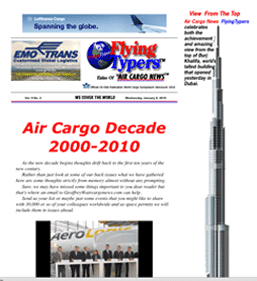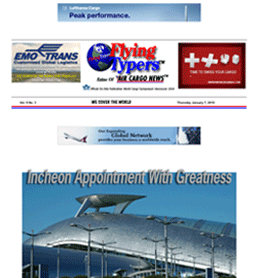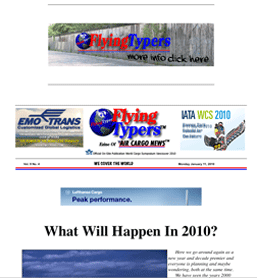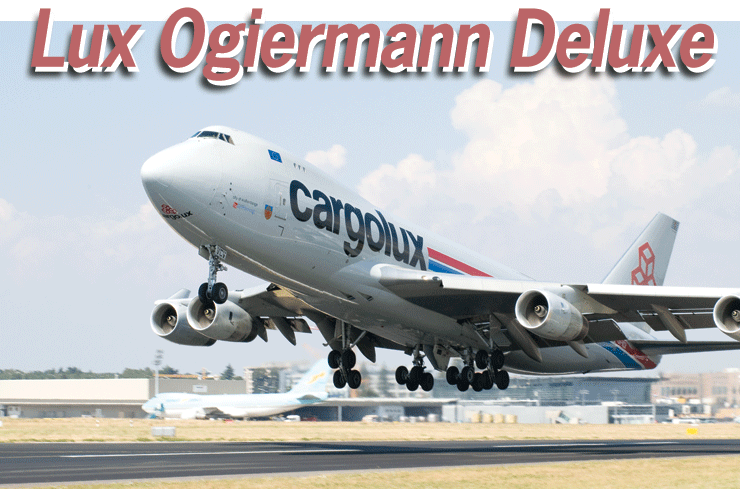 |
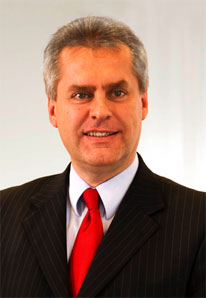 Ulrich
Ogiermann who has been CEO at Cargolux for the past eight years and
now also is giving something back serving as Chairman of The International
Air Cargo Association (TIACA), came out of the passenger business. Ulrich
Ogiermann who has been CEO at Cargolux for the past eight years and
now also is giving something back serving as Chairman of The International
Air Cargo Association (TIACA), came out of the passenger business.
But unlike some others Mr. Ogiermann switched
over to air cargo, first at Lufthansa where he found an industry fairly
well populated with smart, well educated people, so Uli has been moving
up the industry corporate ladder ever since.
Blackberry in hand, this executive seems
at this point a freight man for life.
How the hard-driving Ogiermann got involved
and in this tough climate decided to throw himself into lifting TIACA
with all that it entails is another story.
Safe to say what goes around comes around
as Cargolux during another time under Robert Arendal was the carrier
in air cargo that got behind a fledgling TIACA and where the organization
headed to Luxembourg for the first Air Cargo Forum of the modern era
in 1994.
After Luxembourg, TIACA would go to Dubai
and fill its coffers becoming a rich powerful organization and the rest
as they say is history.
We continue to follow our tack of “What
Will Happen in 2010” with a wide ranging and thoroughly up front
and frank discussion up close and personal with Uli about Cargolux,
TIACA and air cargo 2010.
FT: Please
describe what kind of year it has been for TIACA as an organization?
UO:
We’ve made tangible progress on several
fronts by restructuring the Association to operate more effectively
with a new Board and committee structure. TIACA is now set up to focus
on the three areas where we feel we can add most value to our membership;
industry affairs, education and training, and the Air Cargo Forum.
I am particularly pleased with progress
in the key area of industry affairs. Our Board-approved TIACA positions
on issues such as customs best practice and performance standards, aviation
security, cargo screening, the Certified Cargo Screening Program (CCSP)
in the U.S., the environment, e-freight, Cargo 2000 and modernization
of air traffic management systems.
We now have new and clear policies that
we are using, and will continue to use, to advance the interests of
the air cargo industry. For example, whilst recognizing the TSA’s
requirement for air cargo screening, TIACA is actively pushing the Administration
to expedite its evaluation of new technologies to support the pending
100% cargo screening mandate, scheduled to take effect in August 2010.
Equipment currently certified for use
for screening is inadequate and ill suited for processing palletized
air cargo. Existing technologies are mostly only appropriate for the
passenger-screening environment. New technologies geared towards the
air cargo environment and capable of screening at the consolidated level
are urgently needed. The availability of such technologies could have
a significant impact on how the 100% screening threshold is met.
We have also expressed strong views on
Security Threat Assessments for personnel with unescorted access to
air cargo, both in terms of the need for and cost of reapplication and
the fact that we believe companies have overpaid for this in the past.
We would like to see overpayments refunded to the companies concerned
or credited to future STA applications.
Similarly, we have raised concerns with
TSA about the costs likely to be incurred due to the new screening obligations.
Many TIACA member companies that become
certified screeners will need to acquire costly equipment for each certified
facility. This is significant, particularly given the current economic
downturn, which has reduced air cargo volumes by roughly 25% and threatens
the viability of many companies.
TSA’s decision to allow third party
validation of CCSFs could further increase costs and decrease incentives
for CCSP participation if it is not carefully implemented. If there
are only a few approved third party validators, there would be limited
competition, potentially allowing these companies to price their services
very aggressively, which in turn might discourage shippers and others
in the air cargo supply chain from undergoing CCSF validation. We want
to see clear monitoring of pricing on CCSP validation.
I believe we have a clear direction now
and I am confident that our views reflect the best interests of our
members. I am pleased that we have welcomed more new members in 2009
from across the globe and, despite the market downturn, already received
bookings for over 80% of the exhibition space at our Air Cargo Forum
in Amsterdam in November 2010.
Other initiatives have included our weekly
regulatory updates to members as well as new web-based features such
as free of charge job postings and news announcements. We have also
made excellent progress in building an on-line information bank that
helps TIACA members drill down into much greater details on the issues
being tackled by our Industry Affairs Committee and we are about to
unveil a dramatically revamped and upgraded website that will make this
information more accessible to our members.
We have also ended the year on a strong
note by signing a contract with Incheon International Airport, the world’s
second largest cargo airport, to host our Forum in 2014. This is in
line with our commitment to take the event to major cargo centres around
the world.
FT: What
does TIACA feel it has contributed to its membership to assist companies
and individual members be able to better deal with new economic realities?
UO:
I think this is a recession that businesses
have been forced to deal with in their own way. It has been rapid and
hard hitting and I think there is little any association could have
done to reduce the pain.
We have focused more on a mid to long-term
approach.
For example, we were quick to counter
a new report on aviation’s impact on the environment. We believed
the ‘Aviation & Global Climate Change in the 21st Century’
paper was misleading and based on ‘considerable uncertainty’
of some of the gases used in the measurement process, which increased
aviation’s previously assessed contribution to climate change
from 3% to 3.5% without cirrus and 4.9% with cirrus.
We have to challenge such reports because
regulators often refer to these in new legislation. We believe the Intergovernmental
Panel on Climate Change (IPCC), which estimated that aircraft emitted
2% of man-made CO2, conducted a more accurate assessment in 1999 –
a figure it forecast would grow to 3% in 2050. The new report continues
to confirm CO2 data that indicates aviation remains 2% of anthropogenic
CO2 but the figure is then increased with the added impact of what we
regard as ‘uncertain gases.’
With future changes such as the EU’s
Emissions Trading Scheme, how aviation is seen to impact the environment
and how legislators try to redress the balance will have a significant
and direct impact on airlines’ bottom lines.
It is often overlooked that the air cargo
industry has already made significant advancements in reducing its carbon
footprint.
Similarly, we are being increasingly vocal
on the “food miles” concept, which is extremely misleading
to the consumer because it does not measure the true carbon footprint
of a product through the whole cycle from planting to the market.
It is clear that by having a strong, well-researched
position, we can make a difference. TIACA and individual air cargo operators
jointly opposed plans for a nighttime curfew at Burbank Airport in California
and the U.S. Federal Aviation Administration (FAA) subsequently rejected
the airport’s application.
This was a victory for common sense. Strong
recognition by the FAA of the value and importance of cargo operations
to the local and national economy will, we hope, set a precedent for
nighttime cargo services and send a clear message to other airports
that may have been considering similar restrictive actions. We hope
the same common sense approach will prevail elsewhere, including in
Europe where nighttime curfews are also under review.
Customs and border practices for air cargo
also require change in order to facilitate trade and economic growth
and to capitalize on air cargo’s key competitive advantage, speed.
We have identified a series of changes we would like to see adopted
in both developed and developing countries and we will continue to work
towards the implementation of these in our discussions with the World
Customs Organization.
FT: Can
you discuss in some broad and perhaps specific strokes what the aims
and agenda will be at TIACA AMS 2010?
UO:
We are expecting a full exhibition hall and
a strong attendance and I think the timing and location are key factors
in this. Amsterdam is a major cargo gateway where industry leaders want
to go and do business anyway. By combining their visit with attending
the Air Cargo Forum they also benefit from the time and cost savings
of being able to see so many customers, partners and prospects, together
in one place at one time.
Key initiatives for 2010 are designed
to give more value for our ACF exhibitors, sponsors and visitors:
We aim to attract more forwarders and
shippers by adopting a conference theme and sessions that are important
to their businesses and streamlining the supply chain.
We are working with shipper and forwarder groups
to help set the conference agenda.
• The
conference will be more flexible with shorter one-hour breakout
sessions addressing key issues during the day.
• ACF 2010 will see
longer and later exhibition times for the exhibition hall.
• There will be only
one gala dinner to free up an evening for exhibitors and delegates
to organize their own business and social events. The second gala
has been substituted with a reception in the exhibition hall which
will offer our exhibitors more face time with customers in a more
social setting.
•An additional
complimentary conference pass for each exhibition space will be
available for every exhibitor. |
We are also looking to involve
other associations such as IATA, FIATA, AEA and shippers’ groups
to make the ACF truly industry-wide.
FT: How
has your term of Presidency impacted TIACA so far?
UO:
I think we have achieved a great deal
in terms of streamlining the Association and making it more responsive.
Industry Affairs has to be our main focus and we have completed an important
step in establishing a clear position on a wide range of subjects. We
will now use these to promote the best interests of the air cargo industry.
When I took over, I said I also wanted
the Association to build its membership and awareness with shippers
and forwarders. In January, we will be launching free of charge membership
to TIACA for shippers to encourage them to become active participants
in the Association.
I’m also pleased to see that we
have now formalized collaborative relationships with other trade associations
and are looking forward to working together on common objectives in
2010 to advance our industry.
FT: How
difficult has it been to apply your vast experience toward the public
good (TIACA) when business is so tough? How have you found the time?
UO:
It is truly a tough call, as the business
requires full attention at this very moment. At the same time TIACA
needs full focus as well, especially as we are rejuvenating our approach
to the most important industry topics and a lot of change is on the
way. It is very rewarding to have great colleagues on the Board who
make this a real team-effort and one stands in for the other. We have
several new members who bring in new experience and fresh momentum.
This mix, together with a well-established and experienced team in our
organization, is the right recipe to deliver results for our members
despite the current challenges of the markets.
FT: As
CEO of a major air cargo resource, what does recent financial news that
Luxair is now 52% stockholder in Cargolux mean? What changes? What lies
ahead?
UO:
We are grateful to the shareholders who have
helped to restructure the capital-base of the company. With their support
it has been possible to buy out the liquidator of the defunct Swissair-stake
from "SAirlines". This "Portage" (bridging-solution)
has temporarily increased the shareholding of some of the shareholders
(including Luxair) but the target is to forward this stake again to
a new partner. Luxair, as well as the other shareholders have no intention
to change the business proposed by management. Luxair will always remain
a major shareholder and our provider of state-of-the-art handling services
at the airport of Luxembourg.
FT: If
you were given an opportunity to make some sweeping changes in air cargo
and there was a short list—what would you do?
UO:
The biggest wish would be to develop a truly
rewarding concept of generating "round-trip-cargo," a product
that would resemble the passenger product. But there is no such thing
and we will have to deal with imbalances and one-way traffic as before.
Jokes aside:
There would be a clear sequence: Firstly,
align the security regimes worldwide to facilitate airfreight rather
then preventing cargo from being transported. Secondly, make airfreight
much more efficient with the implementation of e-freight 3. Big challenge
for the years to come: change the image of the industry to being an
environmentally-friendly industry that will step-by-step implement modern
aircraft that are producing less emissions, less noise and use less
fuel. Last but not least: have a greater interaction with shippers to
spell out the advantages of airfreight in terms of time to market and
capital binding effects of a long transportation chain. Using airfreight
is beneficial to a lot of businesses and delivers profitable entries
to markets which otherwise are shut!
FT: Please
offer and best/medium/worst case scenario for air cargo in 2010 and
beyond. Which do you think will happen and why?
UO:
No one has a crystal ball. My overall judgement
is that the markets have reacted too steeply downwards, the current
reverse trend will also only be a step towards a new equilibrium. This
new level will establish itself somewhere initially down from the figures
of 2008 and with a slow, gradual growth as of 2010. We currently do
not fully grasp the impact of government spending in the economies worldwide
and the effect of stimulus-packages on trade. This means that the current
upward trend might again decline somewhat once the immediate effect
of those packages is absorbed. Volatility will dominate the coming months
and maybe even years. I am a firm believer in long term globalization:
this trend will prevail and there are ample opportunities in running
global supply chains. Air cargo will again become a good business to
be in but there will be changes. A moderate growth form the levels of
2009 will be the expected scenario in 2010. Anything better is best
case.
FT: Often
you are able to speak internally to the TIACA membership about various
topics and situations. At this time can you share some thoughts about
our business; why you are part of it; whether given the chance you would
choose this career again, and where you think all of future and us generations
must do to insure our future?
UO:
This industry is a challenge in itself due
its complexity—a global business which has transformed itself
over the years in line with the requirements of global trade and the
necessity to build efficient supply chains. The flexilibility required
to permanently improve the product offered to our clients keeps us on
our toes. I would certainly not like having missed these exciting years
of change in the industry. Our industry as well as all others will have
to live up to discussions around climate change and controlling emissions
to ensure the well-being of future generations. Enviromental care will
be an ever more important value and our industry will have to justify
the need for transport on an ongoing basis.
Overall: aircargo will be strong
again after this sharp downfall. Just-in-time concepts will be more
important then ever as companies will want to keep low inventory. This
policy always has always driven airfreight and is a logical part of
it.
Also time-to-market will be of utmost
importance to companies: the life-cycle of products will not be
stable and be extremely shortened with modern technology changing fast.
This again requires airfeight.
The industry will face steep changes: economies
of scale are underdevelopped due to outdated regimes such as ownership-rules.
This will have to change under the economic pressures airlines are faced
with.
Geoffrey Arend
|




 Ulrich
Ogiermann who has been CEO at Cargolux for the past eight years and
now also is giving something back serving as Chairman of The International
Air Cargo Association (TIACA), came out of the passenger business.
Ulrich
Ogiermann who has been CEO at Cargolux for the past eight years and
now also is giving something back serving as Chairman of The International
Air Cargo Association (TIACA), came out of the passenger business. Air
Cargo News FlyingTypers leads the way again as the world’s first air
cargo publication to connect the industry to the broadly expanding and
interactive base for social commentary—Twitter.
Air
Cargo News FlyingTypers leads the way again as the world’s first air
cargo publication to connect the industry to the broadly expanding and
interactive base for social commentary—Twitter.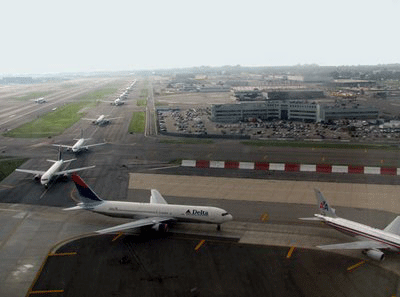
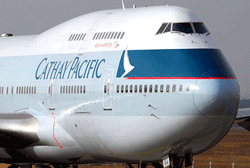
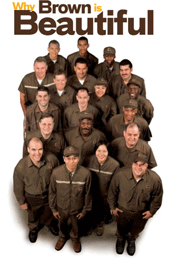
 January 11: Sign of the Times
. . . UPS lays off 1,800 management & administrative positions in
small package. 1,100-get separation deal, 700 get no package?
January 11: Sign of the Times
. . . UPS lays off 1,800 management & administrative positions in
small package. 1,100-get separation deal, 700 get no package? 